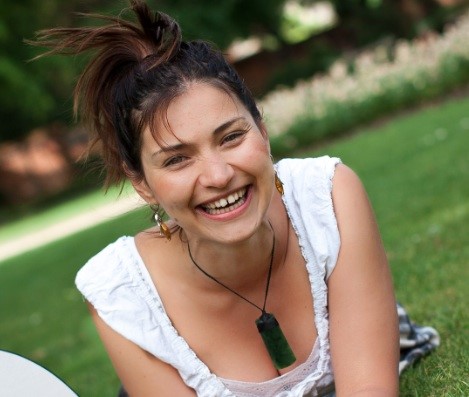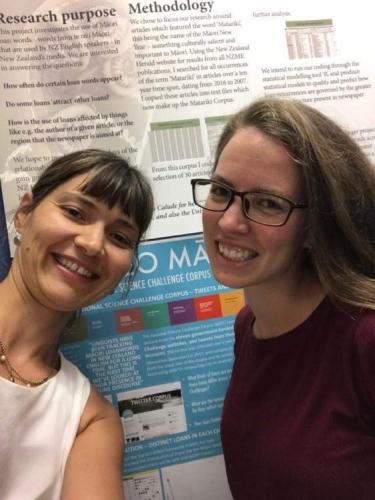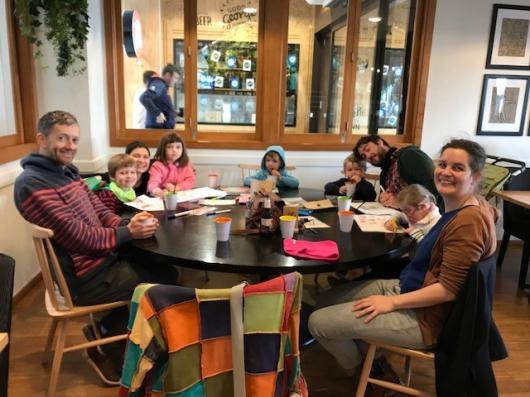Dr Andreea Calude

An interview with Marsden Fund recipient, linguist and Senior Lecturer, Dr Andreea Calude of University of Waikato. A Romanian-born New Zealander and researcher across a range of languages, Andreea is particularly interested in 'loan words', words like ‘whānau’, that we use from another language that are mostly understood by people who don’t speak the language.
Currently, Andreea is studying how the mechanisms of Māori loan words, such as aroha, hui and reo spread into New Zealand English, working with Dr Hēmi Whaanga from the Faculty of Māori and Indigenous Studies and statistician Dr Steven Miller.
For their research – through a process of examining spoken everyday conversations, as well as newspaper articles – they take into consideration linguistic factors such as word meanings and the sociolinguistic factors of those speaking: their gender, ethnicity and age, and whether there is consistency in how the loan words are used.
The borrowing of loan words provides interesting research concepts for linguistics as a field of inquiry, as well as for the wider community since borrowing of Māori words constitutes a mechanism for identity marking in Aotearoa New Zealand.
Q: What is it particularly about te reo that interests you?
A: My interest is not in te reo per se (though I find te reo also fascinating because of its grammar). My interest is primarily in New Zealand English - that is to say, the English that we Kiwis use. I find it interesting that Kiwis (in general) use many Māori words, some of which we do not even realise are Māori.
Q: What are your favourite loan words?
A: I don't have any favourite loans as such... I quite like the word whānau because I think English does not have a good equivalent – extended family does not quite capture it. The way we use the word nowadays, it goes beyond genealogical ties, and it brings with it the notion of inclusiveness, all the while leaving it slightly ambiguous, which is sometimes handy.
Q: What impact do you want your research to have?
A: I would love it for my research to inspire new generations of linguists and language researchers to ask questions about language. Everyone thinks they are a bit of an expert on language merely because they use it, but, in reality, linguistics research has overturned many of the 'language myths' that people hold: women do not speak more than men, learning more than one language at a time as a child is not bad for you (quite the contrary), text language is not ruining children’s literacy levels... I could go on.
Linguists are not mere punctuation and spelling gurus; they are trained to look at language-in-action and to study how language is used in our everyday lives to entertain, to court, to annoy, to manipulate, to promise, to defend, to impress, to bond and so on. Language is, of course, one of the most impressive human traits we have as a species and one that we all have a stake in regardless of education, class, gender or race.
Q: Why is your research important for Aotearoa?
A: Ideally, if I do my job well, I hope to bring a contribution towards promoting and celebrating the use of New Zealand English: our English, our unique variety of words, structures and sounds to capture our own unique view of the world.

Andreea with summer scholar Louise Stevenson - they have a joint paper coming out soon in the Journal of the Royal Society of New Zealand.
More about Andreea
Andreea gained her PhD in Linguistics from the University of Auckland and has worked in a variety of different roles. She did a postdoc in the Evolutionary Biology and Applied Statistics Lab at the University of Reading, UK for four years. At the University of Auckland, Andreea undertook research for the Austronesian Database Language project in the Department of Psychology, and also worked on the grammar and dictionary project for Takuu language for the Centre for Pacific Studies. In 2016 she was awarded a $300,000 Marsden Fund Fast-Start grant towards her study on Māori loan words and the evolution of language.
Andreea is a guest author for Sciblogs where she writes about different aspects of linguistics and grammar. She is also the Editor-in-Chief of the open access journal Te Reo - the Journal of the Linguistic Society of New Zealand.
When she’s not rigorously studying the meaning of language, Andreea spends time with her husband and two young children.
"I am incredibly grateful for the support that the Marsden Fund has lent me and this project. Having it has allowed me to harness all my time and attention towards this exciting project. Moreover, it has allowed me to attract graduate students to work under my guidance, and to send them to international conferences to present findings from our joint work on how loan words are used in our unique variety of English, here in Aotearoa New Zealand. Being able to inspire and lead a new group of researchers in this way has breathed fresh motivation and energy into my own work and this would have not been possible without the generous support of the Marsden Fund."

Andreea with her husband, two kids and Dr Eline Zenner, who came out from Belgium with her family to collaborate with Andreea for the Marsden Fund project.
In the news: How Māori and English languages mix in the modern world
Andreea Calude
Dr
Linguistics research has overturned many of the 'language myths' that people hold: women do not speak more than men, learning more than one language at a time as a child is not bad for you (quite the contrary), text language is not ruining children’s literacy levels... I could go on.
